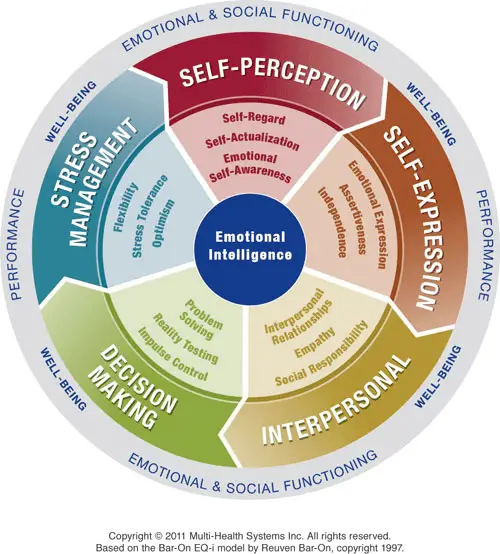Self-Perception
Self-Regard – Respecting oneself while understanding and accepting one’s strengths and weaknesses. Self-Regard is often associated with feelings of inner strength and self-confidence.
Self-Actualization – Persistently trying to improve oneself and engage in the pursuit of personally relevant and meaningful objectives that lead to a rich and enjoyable life.
Emotional Self-Awareness – Recognizing and understanding one’s own emotions. This includes the ability to differentiate between subtleties in one’s own emotions while understanding the cause of these emotions and the impact they have on the thoughts and actions of oneself and others.
Self-Expression
Emotional Expression – Openly expressing one’s feelings verbally and non-verbally.
Assertiveness – Communicating feelings, beliefs and thoughts openly, and defending personal rights and values in a socially acceptable, non-offensive, and non-destructive manner.
Independence – Being self directed and free from emotional dependency on others. Decision-making, planning, and daily tasks are completed autonomously.
Interpersonal
Interpersonal Relationships – Developing and maintaining mutually satisfying relationships that are characterized by trust and compassion.
Empathy – Recognizing, understanding, and appreciating how other people feel. Empathy involves being able to articulate your understanding of another person’s perspective and behaving in a way that respects others’ feelings.
Social Responsibility – Willingly contributing to society, to one’s social groups, and generally to the welfare of others. Social Responsibility involves acting responsibly, having social consciousness, and showing concern for the greater community
Decision Making
Problem Solving -Finding solutions to problems in situations where emotions are involved. Problem solving includes the ability to understand how emotions impact decision making.
Reality Testing – Remaining objective by seeing things as they really are. This capacity involves recognizing when emotions or personal bias can cause one to be less objective.
Impulse Control – Resisting or delaying an impulse, drive or temptation to act and involves avoiding rash behaviors and decision making.
Stress Management
Flexibility – Adapting emotions, thoughts and behaviors to unfamiliar, unpredictable, and dynamic circumstances or ideas.
Stress Tolerance – Coping with stressful or difficult situations and believing that one can manage or influence situations in a positive manner.
Optimism – Remaining hopeful and resilient, despite occasional setbacks. Optimism is an indicator of one’s positive attitude and outlook on life.
Previous: EQ-i2.0 & EQ360 Assessments

